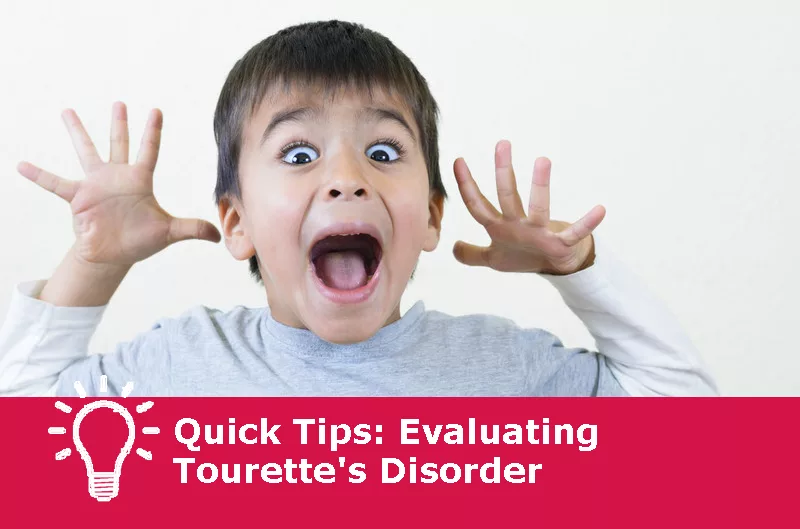Despite lots of scientific investigation, the cause of TD remains relatively unknown. Most investigations seem to implicate hyper-functioning dopamine circuits. At least one study showed that antipsychotic medications, which block dopamine transmission, are beneficial in suppressing tics. (Robertson, MM. Arch Dis Child Educ Pract Ed 2012;97(5):166-175).
That said, before you consider treatment options, a thorough TD evaluation is important. In an article from the Carlat Child Psychiatry Report, authors Barbara Coffey, MD, MS, J. Maxwell Luber and Melissa Fluehr recommend the following three steps for initially evaluating young patients, who have either Tourette’s or another form of tic disorder:
1. Come up with a problem list of target symptoms for treatment. Ask the parents and child to tell you about the most problematic symptoms, and obtain collateral symptom information (about attention, activity, OCD, etc.) from teachers, other caregivers, and clinicians familiar with the child.
2. Next, prioritize the problem list based on those symptoms causing the most distress or impairment. Often parents, especially those of very young children, are more troubled by tics than their child.
3. Then, since tics often fluctuate and change in type, location, and intensity, make sure to review the child’s specific course and patterns of tics over time. That way, if tics seem to increase after starting treatment, you’ll have a better sense of whether this is a normal symptom fluctuation as opposed to a medication side effect.
Prepare the family so that they can make informed treatment decisions. As part of your initial assessment, and if it is relevant to the child’s symptom patterns, talk with parents about the course of tics, ADHD, and OCD, as well as PANS/PANDAS.
Want to know what to do next, including recommended treatment options? Subscribers to The Carlat Child Psychiatry Report can read the full article.
That said, before you consider treatment options, a thorough TD evaluation is important. In an article from the Carlat Child Psychiatry Report, authors Barbara Coffey, MD, MS, J. Maxwell Luber and Melissa Fluehr recommend the following three steps for initially evaluating young patients, who have either Tourette’s or another form of tic disorder:
1. Come up with a problem list of target symptoms for treatment. Ask the parents and child to tell you about the most problematic symptoms, and obtain collateral symptom information (about attention, activity, OCD, etc.) from teachers, other caregivers, and clinicians familiar with the child.
2. Next, prioritize the problem list based on those symptoms causing the most distress or impairment. Often parents, especially those of very young children, are more troubled by tics than their child.
3. Then, since tics often fluctuate and change in type, location, and intensity, make sure to review the child’s specific course and patterns of tics over time. That way, if tics seem to increase after starting treatment, you’ll have a better sense of whether this is a normal symptom fluctuation as opposed to a medication side effect.
Prepare the family so that they can make informed treatment decisions. As part of your initial assessment, and if it is relevant to the child’s symptom patterns, talk with parents about the course of tics, ADHD, and OCD, as well as PANS/PANDAS.
Want to know what to do next, including recommended treatment options? Subscribers to The Carlat Child Psychiatry Report can read the full article.


_-The-Breakthrough-Antipsychotic-That-Could-Change-Everything.webp?t=1729528747)



